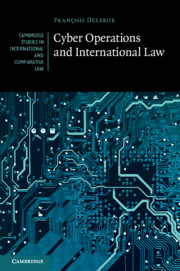Book contents
- Cyber Operations and International Law
- Cambridge Studies in International and Comparative Law: 146
- Cyber Operations and International Law
- Copyright page
- Contents
- Abbreviations
- 1 Does International Law Matter in Cyberspace?
- Part I Attribution
- Part II The Lawfulness of Cyber Operations
- 5 Internationally Wrongful Cyber Acts: Cyber Operations Breaching Norms of International Law
- 6 The Threshold of Cyber Warfare: from Use of Cyber Force to Cyber Armed Attack
- 7 Circumstances Precluding or Attenuating the Wrongfulness of Unlawful Cyber Operations
- 8 Cyber Operations and the Principle of Due Diligence
- Part II – Conclusion
- Part III Remedies against State-Sponsored Cyber Operations
- 11 Conclusion
- Appendix Table Assessing the Lawfulness of Cyber Operations and Potential Responses
- Select Bibliography
- Index
- Cambridge Studies in International and Comparative Law
8 - Cyber Operations and the Principle of Due Diligence
from Part II - The Lawfulness of Cyber Operations
Published online by Cambridge University Press: 28 February 2020
- Cyber Operations and International Law
- Cambridge Studies in International and Comparative Law: 146
- Cyber Operations and International Law
- Copyright page
- Contents
- Abbreviations
- 1 Does International Law Matter in Cyberspace?
- Part I Attribution
- Part II The Lawfulness of Cyber Operations
- 5 Internationally Wrongful Cyber Acts: Cyber Operations Breaching Norms of International Law
- 6 The Threshold of Cyber Warfare: from Use of Cyber Force to Cyber Armed Attack
- 7 Circumstances Precluding or Attenuating the Wrongfulness of Unlawful Cyber Operations
- 8 Cyber Operations and the Principle of Due Diligence
- Part II – Conclusion
- Part III Remedies against State-Sponsored Cyber Operations
- 11 Conclusion
- Appendix Table Assessing the Lawfulness of Cyber Operations and Potential Responses
- Select Bibliography
- Index
- Cambridge Studies in International and Comparative Law
Summary
The principle of due diligence is an obligation on States not to knowingly allow the use of their territory for the perpetration of acts contrary to the rights of other States. The duty of diligence was referred to by the International Court of Justice in the Corfu Channel case: every State has the 'obligation not to allow knowingly its territory to be used for acts contrary to the rights of other States'. The duty of diligence can be transposed to cyber activities. This would mean that it imposes a duty on States not to allow their territory to be used for the launch or transit of cyber operations targeting another State. In that perspective, due diligence may constitute an interesting palliative to the problem of attribution. The principle of due diligence in international law is particularly relevant regarding the behaviour of non-state actors, since the principle subjects this behaviour to some limitations imposed by international law by creating a bridge between them and State responsibility.
Keywords
- Type
- Chapter
- Information
- Cyber Operations and International Law , pp. 353 - 376Publisher: Cambridge University PressPrint publication year: 2020

